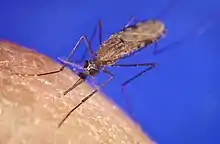Walborg Susanna Thorsell (12 February 1919 – January 2016) was a Swedish scientist who performed research mainly on mosquitoes and mosquito repellents.
Education
Thorsell defended her thesis for her doctorate in veterinary medicine at the Swedish Veterinarian Institute in 1967,[1] and was a docent in experimental parasitology.[2]
Research

Thorsell started her studies on mosquitoes while working at the Swedish National Defence Research Institute (FOA). At that time claims circulated, from both the United States and the Soviet Union, that the other part was conducting experiments with malaria mosquitos in relations to biological warfare. The Swedish military therefore felt it necessary to develop a mosquito repellent, especially for malaria mosquitoes, to be used by Swedish soldiers. The existing repellents were either not efficient enough or had unwanted side effects, so Thorsell and her group of researchers at FOA began looking for a better agent. The substance diethylamide proved to be an excellent repellent for both malaria mosquitoes and ordinary Swedish forest mosquitoes. But in its unmodified form, it is water-soluble and was washed away by the sweat when applied on the soldiers. Thorsells' solution to this was to add the same functional groups as in diethylamide to mandelic acid.[3] This resulted in a mosquito repellent, called DEMIDEX, that was manufactured during a number of years.[2][4] DEMIDEX was more efficient than the American DEET, which was and still is the most common active ingredient in insect repellents.
After retiering from FOA, Thorsell continued her research on mosquito repellents at the Department of Zoology at Stockholm University. That research resulted in the repellent ingredient IXNIX.[2] She died in January 2016 at the age of 96.[5]
Honours
A family of bacteria, Thorselliaceae, found in vector mosquitoes, mainly with vectors of malaria, has been named after Thorsell. The family contains the genus Thorsellia of which three species are known so far.[6][7]
Bibliography
A selection.
- Krigsepidemiologi och hälsovård för totalförsvaret: dokumentation från FOA informationsdag, översiktsdag, Stockholm, 1982-05-05 (Warfare epidemiology and health care within the Swedish total defence : documentation from the FOA conference, Stockholm, 82-05-05) 1983[8]
- Människans fysiska tålighet i brandmiljö: brandgaser och rök (Man's physical tolerance in fires: fumes and smoke) 1984[9]
- Människan och ohyran - bekämpningsmedel i Sverige förr och nu (Man and Vermin – pesticides in Sweden, past and present) 2001[10]
References
- ↑ Thorsell, Walborg (1967). Studies on the effect of hexachlorophene on the cuticle and the intestine from liver flukes, Fasciola hepatics L., incubated in vitro. Acta veterinaria Scandinavica. Supplementum, 0065-1699 ; 20. Copenhagen.
{{cite book}}: CS1 maint: location missing publisher (link) - 1 2 3 "Efter 30 års forskning har Walborg Thorsell fått fram världens bästa insektsmedel" [Thorsell has found the best insect repellent after 30 years of research]. Uppfinnaren (in Swedish). Halmstad (6). 2000.
- ↑ "Aromatic .alpha.-hydroxyamides with insect repellent properties". www.patents.justia.com. Justia. 19 July 1978. Retrieved 18 February 2015.
- ↑ "Information om föremål: Myggbekämpningsmedel" [Information about objects: Insect repellents]. www.tekniskamuseet.se (in Swedish). Swedish National Museum of Science and Technology. Archived from the original on December 4, 2008. Retrieved 22 July 2009.
- ↑ "Walborg Thorsell – Upsala Nya Tidning". 26 January 2016.
- ↑ Kämpfer, P; Glaeser, SP; Nilsson, LKJ; Eberhard, T; Håkansson, S; Guy, L; Roos, S; Busse, HJ; Terenius, O (2015). "Proposal of Thorsellia kenyensis sp. nov. and Thorsellia kandunguensis sp. nov., isolated from the larvae of Anopheles arabiensis as members of the family Thorselliaceae fam. nov". Int J Syst Evol Microbiol. 65 (Pt 2): 444–451. doi:10.1099/ijs.0.070292-0. PMID 25385997.
- ↑ Kämpfer, P; Lindh, JM; Terenius, O; Haghdoost, S; Falsen, E; Busse, HJ; Faye, I (2006). "Thorsellia anophelis gen. nov., sp. nov., a new member of the Gammaproteobacteria". Int J Syst Evol Microbiol. 56 (Pt 2): 335–338. doi:10.1099/ijs.0.63999-0. PMID 16449435.
- ↑ Bränd-Persson, Åsa; Thorsell, Walborg (1983). Krigsepidemiologi och hälsovård för totalförsvaret: dokumentation från FOA informationsdag, översiktsdag, Stockholm, 1982-05-05 [Warfare epidemiology and health care within the Swedish total defence : documentation from the FOA conference, Stockholm, 82-05-05]. FOA rapport. C. 5, 0347-7665 ; 54050-H1 (in Swedish). Stockholm: Swedish Defence Research Agency, dept 5. Retrieved 18 February 2015.
- ↑ Thorsell, Walborg (1984). Människans fysiska tålighet i brandmiljö: brandgaser och rök [Man's physical tolerance in fires: fumes and smoke]. FOA rapport. C. 5, 0347-7665 ; 54053-H1 (in Swedish). Stockholm: Swedish Defence Research Agency, dept 5. Retrieved 18 February 2015.
- ↑ Thorsell, Walborg; Tunón, Håkan (2001). Människan och ohyran: bekämpningsmedel i Sverige förr och nu [Man and Vermin - pesticides in Sweden, past and present]. Studia ethnobiologica, 1403-5359 ; 7 (in Swedish). Uppsala: Centrum för biologisk mångfald. ISBN 91-89232-07-0. Retrieved 18 February 2015.